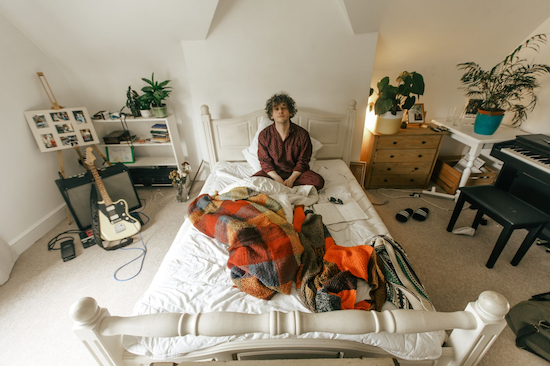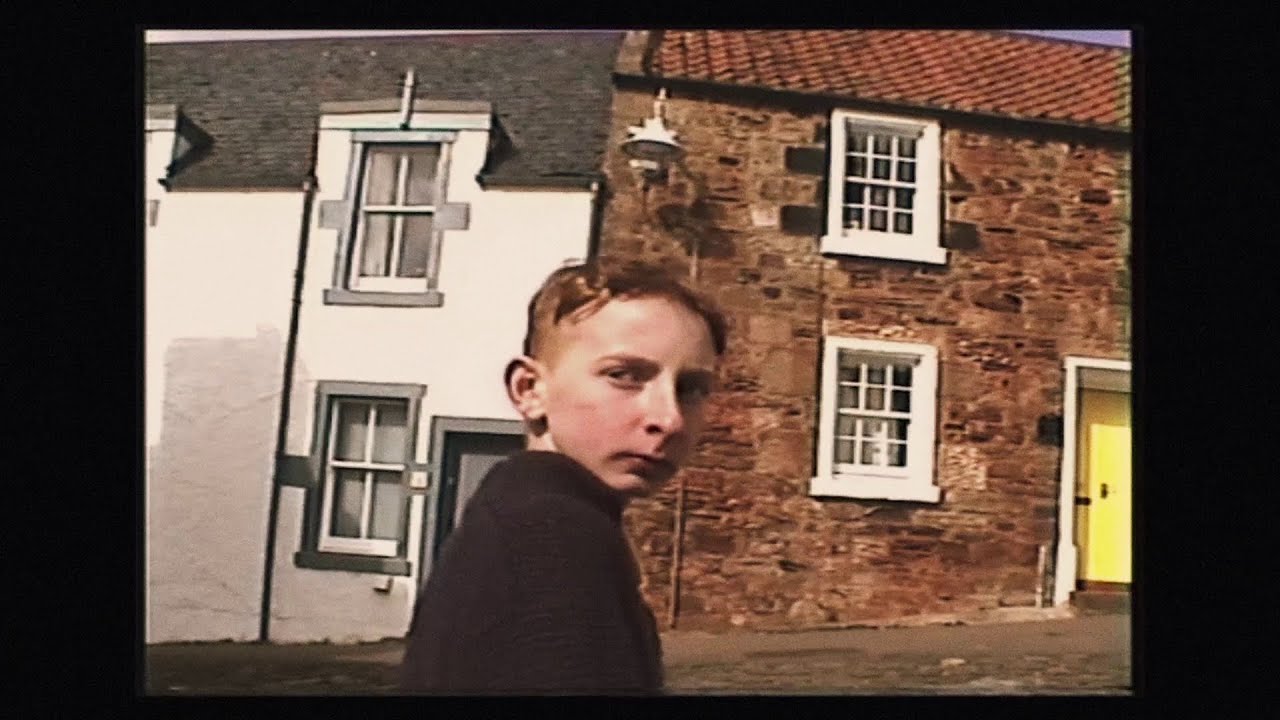Photos by Marieke Macklon
Bill Ryder-Jones meets me off the train in West Kirby, his small, coastal hometown at the end of Merseyrail’s Wirral Line. He’s affable in the manner of a friendly older cousin, acting at times as if we’ve known each other years, jabbing me lightly on the shoulder when he makes a joke – which are always just the right level of irreverent. He turned 40 a few months ago, but the only clue is in the specks of grey that have begun to appear in his stubble and a tussle of brown hair. He says some of the heavy lifting on this front is being done by what he’s wearing. He’s dressed head to foot in box-fresh Adidas gear sent to him via his label, after coming home from holiday with no clean clothes. “I’m well aware that this isn’t what 40 should look like,” he laughs. We first pop quickly into a corner shop called Cosmic News, where he buys a disposable vape and a bottle of water. Inside he points out the screen that displays security camera footage and tells me that it used to be his. He suffers regularly from panic attacks, and the previous owners of the shop would often provide him a place to recentre himself, so in return he gifted them a spare television. Then it’s barely a minute’s walk to his studio, Yawn, where he records his own work and produces for other musicians. “Unless there’s anywhere else you’d like to see?” He seems primed to offer me a tour, as he’s done to so many other writers who’ve spoken to him here, and a bit relieved when I decline.
It’s not without reason that Ryder-Jones has become so linked to his hometown. His third solo album was titled West Kirby County Primary after his old school, its biggest track ‘Two To Birkenhead’ recounting a trip to the town eight miles down the road. Its follow-up, 2018’s Yawn, is named for the studio to which we’re heading, tucked away at the end of a small residential close behind an anonymous-looking door. It’s colder inside than it is outside, and hotter in the summer, he says – there’s a sweet spot of about two weeks per year when the temperature’s just right – but homely nonetheless. He introduces me warmly to a couple of friends and colleagues who are working on music at the desk upstairs, his guitarist and Yawn’s engineer Nathaniel Cummings, and his keyboard player Louie Miles, and on the bathroom walls I spy little pieces of graffiti they’ve left, gently ribbing one another for tardiness, drunkenness and over-use of the toilet. We take a seat in a lightly cluttered back room, Ryder-Jones on a battered couch and me on a stray drum stool, where he asks my permission to light up a cigarette; the vape goes unused.
Like its predecessors, Iechyd Da is thematically centred on The Wirral, Ryder-Jones says. “I felt like I was making music that sounds the way I picture this place, which is raw, seasidey and slow.” Because it was made during the pandemic, when he rarely left the town, the relationship between it and his work became even more tightly intertwined. “You know when you hear an album that you love, and it soundtracks your world for weeks, and everything you see and do has that music in the background? To me it really feels like West Kirby. But then, there isn’t a lot of music that comes out of West Kirby to compare it to. It’s not like Bowie and Berlin.” There’s not been much change in his creative approach since the record’s predecessor. He says he’s “doubled down” on writing about his immediate surroundings. “I exclusively write about things that have happened, and I happen to always be here.” Nevertheless, his present attitude towards his last record is pretty dismissive. Yawn felt too similar to Red House Painters, he says, who he was listening to a lot of at the time. “I don’t remember enjoying writing it, and then when we had to start playing it live, I went ‘I fucking hate doing this. I don’t like playing these songs, they’re not making me happy.’ Every now and then when I listen to a bit of it, I’m like, ‘that’s cool’, and I’m happy it’s a part of my series of records, but I think I’ll always see it as a bit of a thorn.” He’s got more fondness for it, at least, than for West Kirby County Primary. “I fucking hate that one.”
Ryder-Jones is prone to moments of dramatic self-deprecation, as well as light provocation. When I bring up the fact that West Kirby County Primary is probably his most popular work, he leaps up with faux outrage. “Shut your fucking mouth!” ‘Two To Birkenhead’, that album’s riff-driven centrepiece, is probably his biggest hit, but he’d “quite happily never play that song again. Listen to me like I’m Noel Gallagher talking about ‘Live Forever’, but really, I’d quite happily never play any of the loud songs again.” Nevertheless, his dislike for this record in particular seems genuine. “I don’t know what the fuck I was doing there. I think I was scared of having turned 30 and was trying to be a bit younger than I really was,” he says. “I felt like I’d missed my 20s.” He was 21, he points out, when the agoraphobia that emerged during his youth began to develop into something severe, and that his then-band The Coral announced his temporary departure after an eight-hour panic attack during recording sessions in South Wales. He left the band permanently three years later. At that time, things grew so serious, as he recounted in a 2016 short film about mental health in the music industry, that he shared a bed with his mother for almost a year. It was only when he was approaching the end of his 20s that he recovered to the point that his solo career could begin in earnest, but around the time of West Kirby County Primary his drinking was beginning to get out of control. “I wasn’t even that interested in alcohol until then. I was partying a bit, and I think my writing suffered.”

The record he does look back fondly on is 2013’s A Bad Wind Blows In My Heart, his first solo album proper following 2011’s largely instrumental collaboration with the Liverpool Philharmonic, If…. Elegant and understated, it has become the yardstick by which he measures everything he’s made since, “because it felt very much representative of me.” Iechyd Da is a conscious return to that earlier aesthetic. He affectionately knocks the casing of the harmonium that happens to be lying at his feet as we speak, and which he says he used prominently on both. “Sonically I think they’re very similar.” Iechyd Da contains ‘A Bad Wind Blows In My Heart Pt. 3’, a sequel to the two-part composition the earlier LP was named for, and a number of more subtle lyrical easter eggs. Specific characters who he wrote about on the first album reappear on the second – such as the Anthony of Iechyd Da’s ‘Thankfully For Anthony’, the same as A Bad Wind’s ‘Anthony & Owen’. He’s Ryder-Jones’ oldest friend, and a former flatmate of ten years. His appearance, however, is a link between the two records that only emerged later. “That song is about people showing their love for you, and Anthony just happened to do that in the weeks where I was in a good writing stride,” Ryder-Jones says.
There is a long pause when I ask for specifics, but then the story is told unvarnished. “I’d accidentally got quite dependent on Valium during lockdown. I had had a bad breakup-slash-breakdown and then had a gig. I’d run out of diazepam, so I bought some Xanax off someone and they were rotten. I just felt really not good. I’d been drinking a bit and probably took a few too many. I felt like something weird was happening. I was texting a bunch of people ‘I love you,’ dramatic as ever, and Anthony was the first to reply. He shot around in his car and took me to the hospital. It wasn’t that severe, I didn’t need a pump or anything, but when he was driving me I did feel very much loved. It was an important moment, and definitely a bit of a wakeup call.” Was writing the song an act of returning the favour? “It’s as close as you can get. Obviously, he would have preferred me sobering up, but that wasn’t an option at the time.”
Under lockdown, the West Kirby he knew was evaporating. “I was terrified, constantly. This place had been my safe place for so many years, but now it was like the apocalypse. The thing that usually helps with the agoraphobia is that when I leave the flat, I can tell within ten feet if I’m gonna struggle or not, and if something’s coming on then the first thing I’ll do is look for an adult, despite being 40. Countless times I’ve been in the park, gone up to someone who seems older than me and said ‘Can I just walk with you for a minute? I feel like I’m losing it.’ But with lockdown, there was nobody about.” Even when there was, because of social distancing regulations “you had to stay apart. I couldn’t go up to someone and give them the card that says ‘I’m Bill, I’ve got a dissociative disorder and agoraphobia and I’m having a panic attack, please can you help?’”
He had only recently moved in with his then-girlfriend, and both were worried about their respective families. Ryder-Jones’ mother was putting herself at daily risk of infection to help vulnerable members of the local community – taking in pets, picking up children from school and helping older people get in and out of bed – while his partner’s parents were living in her native Brazil, where health services had collapsed to the point that oxygen had to be rationed in hospitals. “We’d only been together for a few months and my drinking and Valium use was becoming daily. We also did some psychedelics, which was a terrible, terrible fucking idea. With regards to writing a record it was good, we were still in the honeymoon period so I was trying to show off and write music that I thought she’d love. She’d smoke weed, I’d drink, it was very beautiful. But it didn’t do anything for my panic attacks, my agoraphobia, my flashbacks and my nightmares. Everything got turned up.”
‘This Can’t Go On’, the exquisite, string-carried lead single from Iechyd Da, captures the moment things came to a head. “It would have been about 4 o’clock in the morning. My partner and I had a blazing row and I’d stormed out.” To combat the anxiety that came with being outside, he headed for the relative enclosure of some nearby woods, playing Echo & The Bunnymen’s ‘The Killing Moon’ on repeat in an effort to silence a spiralling inner monologue. “I was raging about the position I was in, raging about the fact that I can’t just storm out of my own house without the emergency can of lager that’s always in my backpack and the emergency diazepam that’s always in my back pocket.” The lyrics flit between that despair and a deep longing for normality – children, a car, a stress-free walk.

Ryder-Jones’ writing rarely takes creative license, which is what makes ‘…And The Sea…’ so unusual. The track features legendary Scouse songwriter Mick Head reading from Ulysses over a hip hop indebted beat. But other than that Iechyd Da is more or less autobiographical. At times it can be unflinchingly so, as on ‘If Tomorrow Starts Without Me’, in which he contemplates what the world might look like were he to die. On ‘Nothing To Be Done’, he sings earnestly that “I just can’t see myself getting past this one.” At others, though, the rays of hope that pierce the gloom – the love that Anthony showed him when he drove him to hospital, for instance, or the little snippets of domestic bliss that he and his ex-partner carved out amid tumult that are recounted on ‘Christinha’ – can feel totally triumphant. Often, thanks to the beauty of so many of Iechyd Da’s instrumentals, all warm strings and tender piano, it’s both extremes at once. For a long time, he says, he resisted the old cliché that making albums is an act of processing. “Admitting it might be cathartic felt a bit embarrassing because it’s something someone’s always gonna ask you,” but now admits that that’s been the case all along. It’s hard not to interpret his 2016 composition ‘Daniel’ for instance, about his brother who fell from a cliff and died during a family holiday when Ryder-Jones was a child, and whose loss has left permanent mental scars on both him and his parents, as anything but.
I wonder how, this time around, he found the process of working on the song ‘We Don’t Need Anyone’, which was inspired by a conversation with his ex-partner “about how our parents, despite doing their best, might not have been the most well equipped”, and features a choir of children. At the time he was working with them, his relationship with alcohol was getting particularly bad. “Obviously I draw the line at being pissed around children, so I was getting quite shaky. It was really, really emotional. I had to excuse myself a few times.” It reminded him, he says, of a less complicated time, before the trauma of losing his brother, rollercoaster teens with The Coral, the onset of mental health problems in his 20s and issues with alcohol. “There was something absolutely joyous about seeing them. Most of my happiest memories are from when I was that age, and I’m looking at these kids that have been through lockdown but they’re still just so full of being kids, all of them dicking about.” The group of children he enlisted were not choristers, rather a shrill little rabble, joyously out of tune and time. “When I listened back to it, there was one little girl stood next to one of the mics just singing whatever the fuck she wanted. Then the teacher made them all get my autograph, which was a really strange moment because they clearly couldn’t give less of a shit. It was a shot of pure dopamine.”
Today, Ryder-Jones says, he’s doing much better when it comes to alcohol. During a recent trip to Belgium to work as producer for indie band Swim Deep, he only realised afterwards that he had barely been drinking at all. “There was this important work to do, and afterwards instead of going to the pub I just wanted to crawl into bed.” Despite an initial wobble, he says he came to terms far more easily with turning 40 last August than he did 30. “Don’t get me wrong, just looking at the numbers four and zero was quite fucking daunting, but you get to a point where you hold your hands up.” On his recent holiday in Tenerife, he had a spliff after one too many drinks, “and all I thought was ‘this is fucking unbearable. I hate this feeling.’ That’s one of the best things that can happen because I know I’m not far away from being like, ‘I can knock this on the head.’ I’d absolutely love – and I can see this as my future – to become one of those unbearably sober people on Twitter, making everyone else feel terrible. I can feel it coming.” I get the sense that he’s only half-joking, not least given the title of his new record, a Welsh toast that can be translated to mean ‘good health’.
Bill Ryder-Jones’ new album Iechyd Da is released on January 12 via Domino




